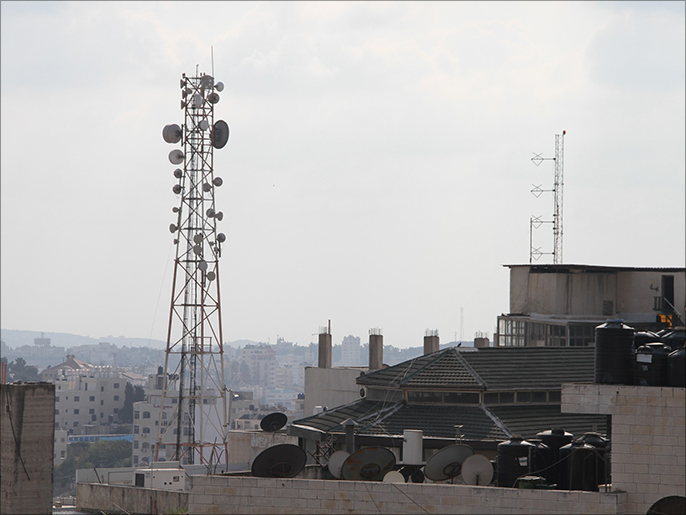As soon as you move away from the center of Palestinian villages and cities in the West Bank, your phone will start roaming on one of the Israeli cellular networks, and the transmission of these networks may overwhelm Palestinian networks in the heart of the main cities.
This is considered an encroachment on the Palestinian land by the occupation, the establishment of towers and networks, and the occupation of the sky by preventing the use of frequencies in accordance with international agreements, according to the Vice President of Al-Quds University and the former Minister of Palestinian Communications, Dr. Safaa Nasereddin.
Israel has security control over more than 60% of the West Bank and East Jerusalem, as it classifies "C" areas - according to the Oslo Accords - and establishes underground communication networks, and uses the heights for broadcasting and relay towers.
And recently, Israeli Communications Minister Yaz Hendel granted a license to the Israeli company Bezeq - which provides fixed-line telephone services - to develop its networks in the West Bank, and to strengthen and expand them to serve settlers.
An Israeli company is installing a strengthening tower on a high rise in the town of Tarqumiya in the West Bank (communication sites)
Occupation of the land and air
says d.
Safaa Nasser Al-Din told Al-Jazeera Net that Israeli communication lines should be treated as settlement goods that must be boycotted, because Israel has not and will not respect the neighborhood agreements on frequencies, she said.
She adds that the recent license of the Israeli company may pave the way for it to work in the West Bank, as it operates in the heart of Jerusalem, Haifa and the 48 cities, meaning that in practice it implements the annexation plans approved by the US peace plan or what is known as the "deal of the century", but by occupying the land and air. .
The Palestinians complain about the high cost of their telecommunications companies compared to the Israeli ones, which our interviewer attributed to several reasons, including:
Preventing drilling and extending networks to Palestinian companies due to Palestinians' lack of continuous control over their geographical areas.
The lack of a national communication portal for Palestine, and the use of the Israeli portal.
- In addition to what Israel is doing in terms of detaining the devices that develop networks and keeping them in Israeli airports for long periods of time, and then destroying them or terminating their maintenance under various security reasons.
Communication towers in the city of Ramallah in the West Bank (the island)
Israeli networks since 36 years
Engineer Samer Ali, Director General of Communications at the Palestinian Ministry of Communications and Information Technology, was not surprised by the Israeli superiority in the field of communications. He says, "Israeli companies compete with Palestinians, and even possess technical and technological capabilities that exceed them."
In his interview with Al-Jazeera Net, Ali added that the Israeli "Bezeq" company has already been operating in the West Bank for 36 years, and the new license for it is a form of Israeli incursion into linking the settlements together through stronger networks at the expense of the Palestinian land.
In addition to the fact that Israeli cellular companies have strong coverage today in Palestinian cities, and they operate illegally and illegally without supervision or control, using frequencies and expanding networks, in addition to the fact that Palestinian companies are deprived of the natural resources at the frequencies that are the right of every state.
Palestinians are also prevented from developing their network infrastructure, and Palestinian cellular networks still provide Internet service through 3G at a lower speed and at a higher cost, which is why Israeli companies that provide 4G and 5G services 5G), which has higher speed and lower cost, competes with the Palestinians in terms of prices and broadcasting power, which has facilitated the introduction of nearly a million Israeli cellular SIM cards into the Palestinian market.
The World Bank estimated the losses of the Palestinian telecommunications sector in 2017 at about $ 300 million annually (Al-Jazeera)
Losses of one billion shekels
Ali refers to a report issued by the World Bank in 2017 under the title "The Missed Opportunity", in which he estimated the losses of the Palestinian telecommunications sector at one billion shekels annually (more than $ 296 million). Today, the losses are expected to increase as the world uses the Internet more.
He considers that the Corona pandemic has worsened the communication network services in Palestine, in light of the need for remote learning and constant communication, and the need for quality and speed of Internet service, and the matter becomes more dangerous if the Israeli networks expand their work, include Palestinian frequencies, and strengthen their terrestrial network.

